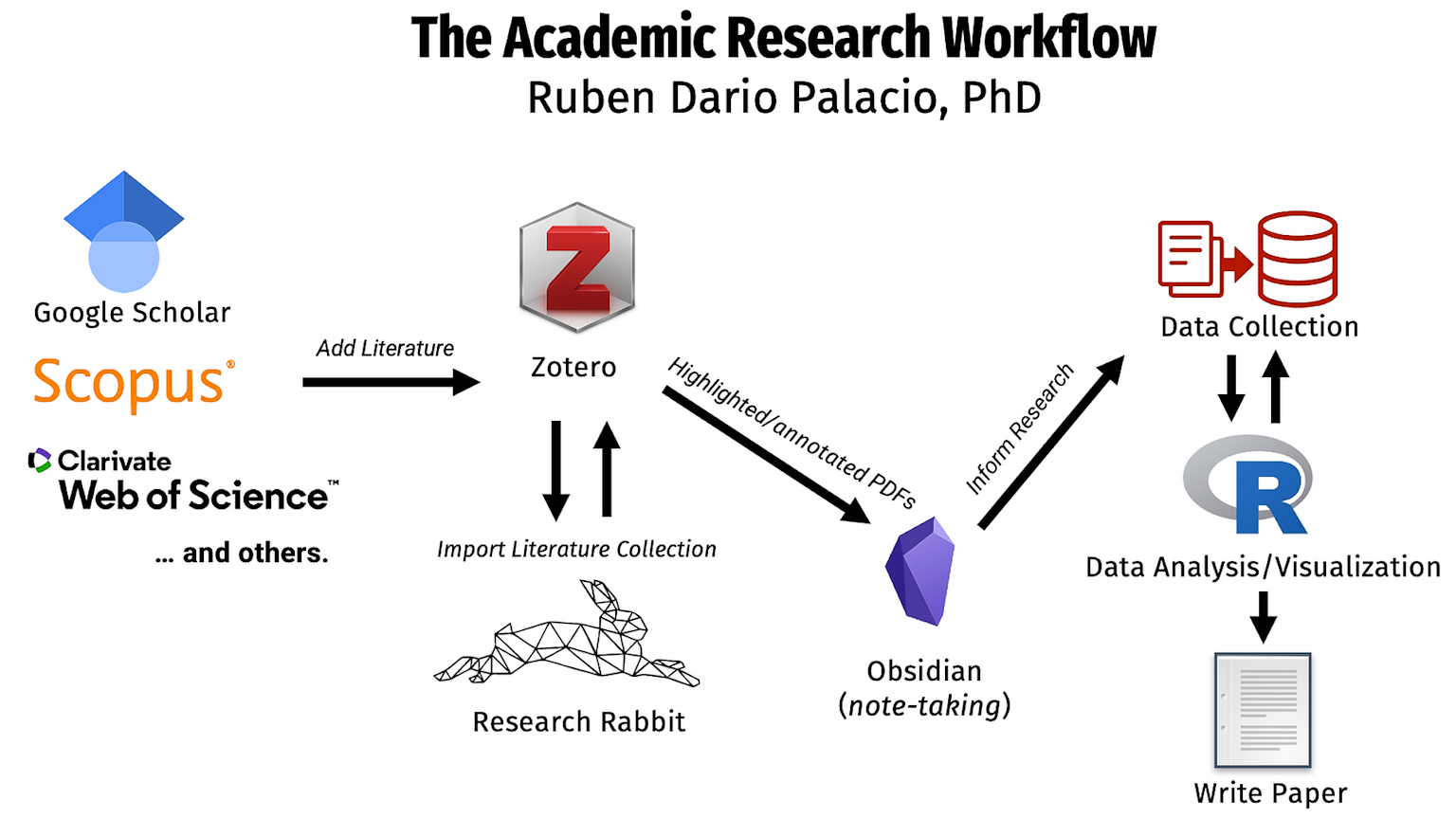The Academic Research Workflow
5 Days
·Cohort-based Course
A Step-By-Step System from Literature Review to Data Analysis to Paper Writing
The Academic Research Workflow
5 Days
·Cohort-based Course
A Step-By-Step System from Literature Review to Data Analysis to Paper Writing
Course overview
Get Published in High-Impact Journals
• Learn and experience first-hand the entire Academic Research Workflow: a system to support every step of your research, from reading papers to doing data analysis and publishing your results.
• You'll get to implement the workflow in your own research project or with teaching data, whichever you like, and receive personalized feedback from Rubén and your class peers.
• You'll have access to templates, frameworks, tools, case studies, and step-by-step guides to help you place your research in the top journals of your field.
• You'll benefit from the accountability and guidance to 3x your academic potential, write scholarly papers, and advance your career.
“A research workflow is the process that moves a scientific investigation from raw data to coherent research question to insightful contribution” - Stoudt et al. 2021.
This course is for you if...
01
You're a graduate student or early-career researcher that wants to publish in top science journals.
02
You're wanting to learn modern tools such as Zotero, Obsidian, Research Rabbit, and ChatGPT.
03
You're struggling with the process of academic writing and publishing, lack confidence, or feel overwhelmed.
Tools you’ll learn in this course
Zotero for reference managing
Learn how to use Zotero Connector. Add literature to your library. Create research collections. Add plugins and integrations. Highlight and annotate PDFs. Exporte notes. Add in-text citations in Word or Google Docs. Manage citation styles. Create a bibliography.
Obsidian for Note Taking
Obsidian is your personal Wikipedia. Link your notes and find them instantly. Create mindmaps and visualize your notes. Embed PDFs to see within your notes. Stop losing your best thinking and start creating. Enhance obsidian functionality with selected plugins.
ResearchRabbit and alternatives
Discover new literature, visualize citation networks, find gaps in the literature, and increase your understanding of your field with state-of-the-art tools including ResearchRabbit, Litmaps, and Scholarcy.
R and Quarto for Reproducible Research
Embrace the paradigm of literate programming to combine text and code for reproducible reports and papers. Use R and Quarto as a lab/computational notebook and for analyzing and visualizing your data.
ChatGPT and other AI tools to assist your research workflows
Unlock the power of ethical use of AI for rewriting, paraphrasing, and polishing your prose. Use prompt techniques for better outputs, including tips to talk and train your AI assistants. Summarize papers, brainstorm research ideas, and make your coding effortless.
... And how to integrate them all!
What people are saying
Dmitry Suholet
Walter Mbamy
Meet your academic coach
Ruben Dario Palacio, PhD.
Ruben Dario Palacio, PhD.
Ruben Dario Palacio is a Colombian biologist. He was granted a Fulbright-Colciencias Ph.D. Scholarship for his doctoral studies in 2016, and graduated in May 2022 with a Ph.D. in Conservation Biology from Duke University.
Since 2016, Dr. Palacio’s scholarly contributions amount to two book chapters and nine peer-reviewed articles. He is a first-author paper in the flagship journal of his field, Conservation Biology (2020), and a first-author paper in Diversity and Distributions (2021), and Ecography (2023), two leading journals in ecology.
He is also a senior author in a front-cover paper of the prestigious Proceedings of the National Academy of Sciences (2018), a research that was entirely conducted by the science team of his Colombian non-profit, Fundacion Ecotonos.
Be the first to know about upcoming cohorts
The Academic Research Workflow
Course syllabus
5 live sessions • 18 lessons • 3 projects
Week 1
Oct
31
Doing a Literature Review
Nov
1
Conducting Research
Nov
2
Writing a Manuscript
Nov
3
Publishing a Paper
Nov
4
Workshop
Doing a Literature Review
Conducting Research
Writing a Manuscript
Publishing a Paper
Bonus
The Academic Productivity System
[Past Workshop] The Academic Research Workflow
Course schedule
12-15 hours/week
Tuesday to Friday
12:00 pm - 2:00 pm EST
Class + live workshop for each module
Saturday
10:00-13:00 pm EST
Q & A, class discussions, exercises, and feedback on the entire research workflow
Learning is better with Peers
Active hands-on learning
This course builds on live workshops and hands-on projects
Interactive and project-based
You’ll be interacting with other learners through breakout rooms and project teams
Learn with a cohort of peers
Join a community of like-minded people who want to learn and grow alongside you
Frequently Asked Questions
Be the first to know about upcoming cohorts
